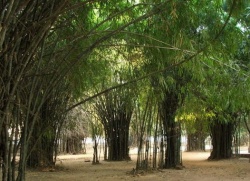Difference between revisions of "Rājagaha"
| Line 1: | Line 1: | ||
[[File:Rajagaha.jpg|thumb|250px|]] | [[File:Rajagaha.jpg|thumb|250px|]] | ||
| − | Rājagaha, meaning ‘King’s Abode,’ was the capital of the Kingdom of Magadha, the largest city in the Middle Land, and was visited by the Buddha on many occasions during his life. It consisted of two parts, the old city built amongst hills, and the new city located on the plain just beyond the hills. Both were surrounded by huge walls, the remains of which can still be seen today. The Buddha praised the beauty of many of the natural and man-made landmarks around the city (D.II,116), his two | + | [[Rājagaha]], meaning ‘King’s Abode,’ was the capital of the Kingdom of [[Magadha]], the largest city in the Middle Land, and was visited by the [[Buddha]] on many occasions during his life. It consisted of two parts, the old city built amongst hills, and the new city located on the plain just beyond the hills. Both were surrounded by huge walls, the remains of which can still be seen today. The [[Buddha]] praised the beauty of many of the natural and man-made landmarks around the city (D.II,116), his two favorite places being the [[Bamboo Grove]] and a low rocky hill called the [[Vultures’ Peak]], just beyond the east gate of the city. Several places in [[Rājagaha]] which are mentioned in the [[Tipiṭaka]] have been identified and excavated by {{Wiki|archaeologists}}. Rājagaha is now called Rajgir and is in the modern north Indian state of {{Wiki|Bihar}}. |
‘Rajagaha in Ancient Literature’, Memoirs of the Archaeological Survey of India, 1938. | ‘Rajagaha in Ancient Literature’, Memoirs of the Archaeological Survey of India, 1938. | ||
| Line 7: | Line 7: | ||
[[Category:Buddhist Terms]] | [[Category:Buddhist Terms]] | ||
[[Category:Places where Gautama Buddha stayed]] | [[Category:Places where Gautama Buddha stayed]] | ||
| + | [[Category:Pali terminology]] | ||
Revision as of 06:37, 27 July 2013
Rājagaha, meaning ‘King’s Abode,’ was the capital of the Kingdom of Magadha, the largest city in the Middle Land, and was visited by the Buddha on many occasions during his life. It consisted of two parts, the old city built amongst hills, and the new city located on the plain just beyond the hills. Both were surrounded by huge walls, the remains of which can still be seen today. The Buddha praised the beauty of many of the natural and man-made landmarks around the city (D.II,116), his two favorite places being the Bamboo Grove and a low rocky hill called the Vultures’ Peak, just beyond the east gate of the city. Several places in Rājagaha which are mentioned in the Tipiṭaka have been identified and excavated by archaeologists. Rājagaha is now called Rajgir and is in the modern north Indian state of Bihar.
‘Rajagaha in Ancient Literature’, Memoirs of the Archaeological Survey of India, 1938.
